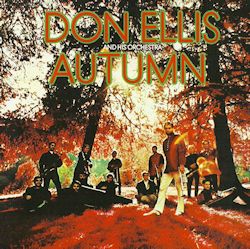1. Variations for Trumpet
2. Scratt and Fluggs
3. Pussy Wiggle Stomp
4. K.C. Blues
5. Child of Ecstasy
6. Indian Lady
Collective personnel
Don Ellis – Trumpet
Glenn Stuart, Stu Blumberg, John Rosenberg, Bob Harmon – Trumpets,
flugelhorns
Ernie Carlson, Glenn Ferris - Trombones
Don Switzer, Terry Woodson - Bass trombone
Doug Bixby, Roger Bobo - Tuba
Ira Schulman – Alto sax
Frank Strozier - Alto sax, clarinet
Ron Starr - Alto sax, soprano sax, flute, piccolo, clarinet, E-flat
clarinet
Sam Falzone – Tenor sax, soprano sax, flute, clarinet
John Klemmer - Tenor sax, clarinet
John Magruder – Baritone sax, clarinet, bass clarinet
Pete Robinson - Piano, clavinet, electric piano, prepared piano
Mike Lang - Piano, clavinet, electric piano
Ray Neapolitan – Bass, Fender Bass
Dave Parlato - Bass
Ralph Humphrey - Drums
Gene Strimling - Percussion
Lee Pastora - Congas
Mark Stevens - Vibes, percussion
There have been many big bands in jazz but few were as big as Don Ellis’s mighty orchestra. He was a pioneer in this as in several other ways. He had a
trumpet specially made for him with an extra valve so that he could play half-tones; he took an early interest in Indian classical music and electronics;
and he enjoyed playing about with peculiar time signatures.
This CD gives a wide representation of the wide variety of material that Don’s band could achieve. It opens with a long series of Variations which is
almost classical in style and is virtually a one-movement concerto. It is a tour de force, featuring Ellis’s trumpet and displaying the wide range
of effects that he could produce on the instrument, without any loss of feeling. He even plays duets with himself, probably with electronic assistance. The
piece passes through several different tempo changes, including 9/4 and 32/8.
Scratt and Fluggs
is almost diametrically different: a parodic piece which sends up the country-and-western music typified by country duo Lester Flatt and Earl Scruggs. It
is in 5/4 time and includes the band howling and whooping along in true countrified bar-room manner.
Pussy Wiggle Stomp
is another light-hearted piece – set in the unusual time signature of 7/4, with handclaps emphasizing the beat. Here as elsewhere, the arrangements are
witty and ingenious, using the multiple resources of the orchestra and avoiding the clichés of much big-band music. There are several breaks which mislead
the listener into thinking the tune is over before it has finished (the sleeve-note counts 47 false endings!).
Charlie Parker’s K.C. Blues is the only number on the album not written by Don Ellis. It begins with an unaccompanied alto-sax solo by Frank
Strozier which continues when the band enters. Child of Ecstasy is a contrapuntal piece featuring trumpeter Glenn Stuart which makes one wonder if
there is more than one meaning here for “ecstasy”.
The album ends with John Klemmer and Sam Falzone’s tenor saxes duelling, electronically enhanced. As the trombone growls lustily and makes rude noises, the
tune descends into a morass of sound which eventually clears to make way for a percussion duet.
Tracks 4 and 6 were recorded live at Stanford University, capturing the enthusiasm of the audience, but most of the album is recorded with scintillating
clarity – not an easy thing to do with such a large ensemble.
Tony Augarde
www.augardebooks.co.uk
